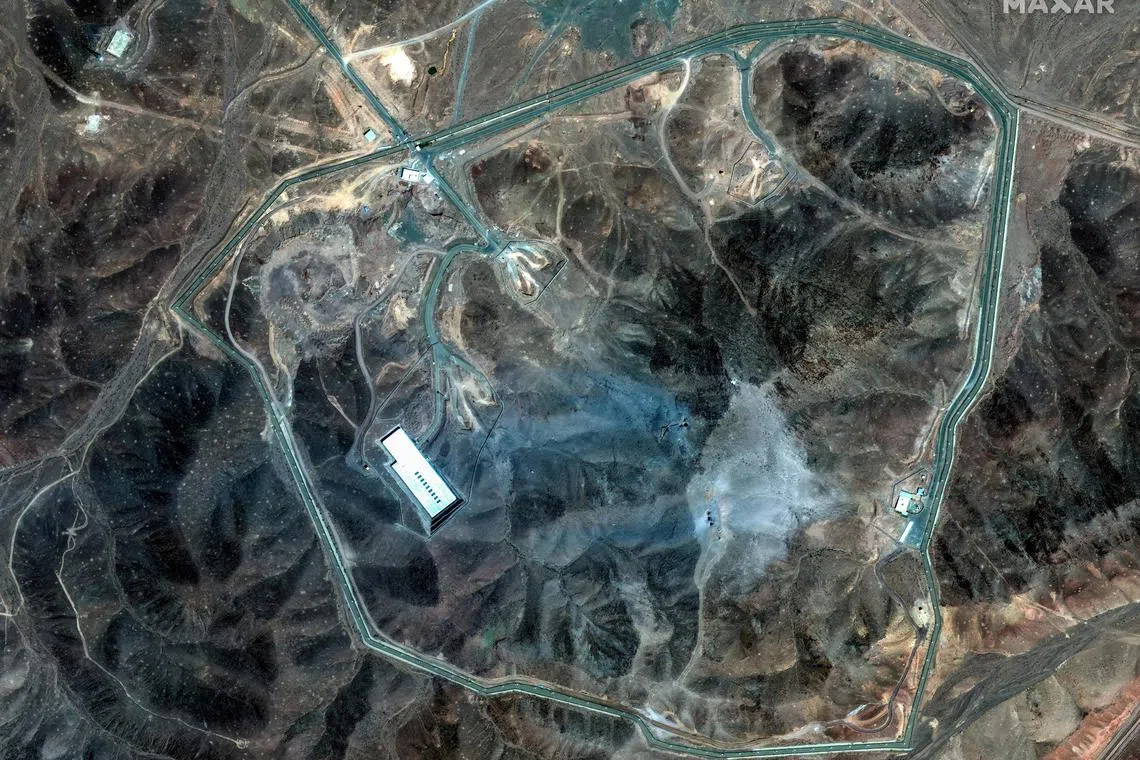US strikes may have set back Iran nuclear programme by just months, sources say
Sign up now: Get ST's newsletters delivered to your inbox

A satellite view showing the site of Iran's Fordow Fuel Enrichment plant, after the US struck the nuclear facility on June 21.
PHOTO: REUTERS
WASHINGTON - A preliminary US intelligence assessment has determined that US strikes at the weekend on Iranian nuclear facilities have set back Tehran’s nuclear programme by only a matter of months, three sources with knowledge of the matter told Reuters.
The initial report was prepared by the Defence Intelligence Agency (DIA) – the Pentagon’s main intelligence arm and one of 18 US intelligence agencies – said two of the sources, who requested anonymity to discuss classified matters.
The classified assessment is at odds with the statements of President Donald Trump and high-ranking US officials, including Defence Secretary Pete Hegseth. They have said the weekend strikes,
Mr Trump has said the attacks were necessary to prevent Iran from developing a nuclear weapon. Iran denies it is seeking such a weapon and says its nuclear programme is for peaceful purposes.
Mr Hegseth on June 22 said the strikes had “obliterated” Iran’s nuclear ambitions, while Mr Trump said Iran’s crucial nuclear sites had been “completely and fully obliterated”.
Assessing the damage at the Fordow, Isfahan and Natanz nuclear sites is expected to be a difficult task, and the DIA is not the only agency tasked with the job. One source said the assessment was not universally accepted and had generated significant disagreement.
A US official, speaking on condition of anonymity, said the US did not know the extent of the damage yet.
Still, the initial assessment indicated the strikes may not have been nearly as successful as the Trump administration has claimed.
One of the sources said Iran’s enriched uranium stocks had not been eliminated, and in fact, the country’s nuclear programme may have been set back by only a month or two.
The Pentagon disputed the notion that the damage to Iran’s nuclear programme was minor, though it did not dispute that the DIA assessment exists.
“Based on everything we have seen – and I’ve seen it all – our bombing campaign obliterated Iran’s ability to create nuclear weapons,” Mr Hegseth said, in a statement provided to Reuters.
“Our massive bombs hit exactly the right spot at each target – and worked perfectly. The impact of those bombs is buried under a mountain of rubble in Iran; so anyone who says the bombs were not devastating is just trying to undermine the President and the successful mission.”
The White House did not immediately respond to a request for comment.
But in a statement to CNN, which first reported the intelligence assessment, White House press secretary Karoline Leavitt said the conclusion was incorrect.
“This alleged assessment is flat-out wrong,” Ms Leavitt said, according to CNN.
“Everyone knows what happens when you drop fourteen 30,000 pound bombs perfectly on their targets: total obliteration.”
Initial military assessments can change as more information comes to light, and it is not uncommon for opinions to vary across different US intelligence agencies.
Democrats have previously said Mr Trump’s claims that the weekend strikes eliminated or seriously set back Iran’s nuclear programme were not yet backed by evidence.
House of Representatives Democratic Leader Hakeem Jeffries said on June 23: “There’s zero evidence that I’ve seen that the nuclear programme was completely and totally obliterated as Donald Trump has claimed.”
Classified briefings on the matter for members of the House of Representatives and Senate were cancelled on June 24. REUTERS


